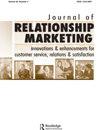客户关系的新视角:关系模型如何影响客户体验及其如何被激活
Q2 Business, Management and Accounting
引用次数: 5
摘要
摘要对客户体验的决定因素进行了大量研究。然而,这些研究没有将关系规范作为客户体验的可能决定因素。然而,有强有力的迹象表明,客户使用的关系规范是影响客户行为和客户体验的重要因素。本文的目的是研究关系模型对客户体验的影响,并解释关系模型存在时可能存在的差异。本文介绍了两项研究的结果。第一项研究的重点是关系模型对客户体验的影响。第一项研究表明,关系类型在消费情绪、客户满意度和推荐意向方面对客户体验有很大影响。由于知道关系模型存在的差异对客户体验有很大影响,第二项研究的重点是找到关系模型存在差异的可能解释。我们假设,关系模型存在的差异可以通过组织如何接近客户以及客户如何感知组织来解释。特别是,客户感知的组织参与和选择自由发挥着重要作用。因此,第二项研究的重点是感知的组织参与和选择自由对关系模型的影响。研究表明,组织参与和选择自由对关系模型的激活有显著影响。这些发现对于那些希望改善客户体验的组织来说很有趣。本文章由计算机程序翻译,如有差异,请以英文原文为准。
New Perspectives on Customer Relationships: How Relational Models Influence Customer Experience and How They Are Activated
Abstract Much research has been conducted into the determinants of customer experience. However, these studies do not include relationship norms as a possible determinant of customer experience. Nevertheless, there are strong indications that the relationship norms used by a customer are an important factor in customer behavior and customer experience. The purpose of this paper is to investigate the influence of relational models on customer experience and to explain possible differences in presence of relational models. This paper describes the results of two studies. The first study focuses on the effects of relational models on customer experience. This first study shows that the type of relationship has a strong influence on customer experience in terms of consumption emotions, customer satisfaction, and recommendation intention. Knowing that differences in the presence of relational models have a strong influence on customer experience, a second study focuses on finding a possible explanation for the differences in the presence of relational models. We hypothesize that differences in the presence of relational models can be explained by how organizations approach their customers and how customers perceive the organization. Especially, the perceived organizational involvement and freedom of choice as perceived by the customer play an important role. The second study, therefore, focuses on the influence of perceived organizational involvement and freedom of choice on relational models. The study shows that organizational involvement and freedom of choice have a significant impact on the activation of relational models. The findings are interesting for organizations that want to improve customer experience.
求助全文
通过发布文献求助,成功后即可免费获取论文全文。
去求助
来源期刊

Journal of Relationship Marketing
Business, Management and Accounting-Marketing
CiteScore
10.20
自引率
0.00%
发文量
7
期刊介绍:
The Journal of Relationship Marketing is a quarterly journal that publishes peer-reviewed (double-blind) conceptual and empirical papers of original works that make serious contributions to the understanding and advancement of relationship and marketing theory, research, and practice. This academic journal is interdisciplinary and international in nature. Topics of interest (not limited to): Evolution and life cycle of RM; theoretical and methodological issues in RM; types of RM, networks and strategic alliances; internal communication, quality, trust, commitment, satisfaction, loyalty, and dissolution in RM; applications of RM in different disciplines and industries; international perspectives in RM; RM strategies in services economy, higher education, and e-commerce; RM, technology, and the Web; profitability and RM; case studies and best practices in RM. If you are interested in becoming an ad-hoc reviewer, please e-mail a brief statement indicating your area of expertise and interest along with a copy of your CV.
 求助内容:
求助内容: 应助结果提醒方式:
应助结果提醒方式:


